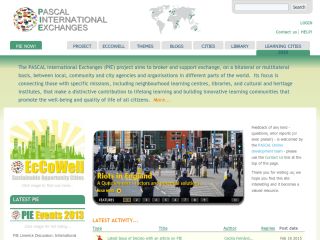The part that interests me particularly is the way that regulation becomes a key part of intervening in markets for mutually productive outcomes. This is not dissimilar to work that we are doing here in conjunction with a local manufacturing authority, on using regulation to drive innovation. The key evidence for this occurring, not surprisingly, comes from Europe. Setting standards which in various ways promote new energy sources (less energy use yet improved performance) is something that Australian authorities and industry have a lot to learn about - we focus mostly on price. Applying the European philosophy explicitly in a regional development ('positioning') context is a very interesting idea. I think that in Australia, regulation in this sector is seen more as a defensive than a positive initiative.
As for the question about whether this makes Denver/Colorado a 'learning city/region', I am less interested in trying to fit anything that moves into a box that suits me. I doubt that there is a city in the world that is not conscious, at present, of the need to be more strategic, more thoughtful about how they are developing, and how they tackle the things that matter to them. Insofar as they have systematic and inclusive processes for action on these issues, they can fit within our (and UNESCO's) notion of learning cities. If they don't see the value in embracing this perspective themselves, I'm not sure that it serves anybody well for us to be doing it on their behalf.








Yes, Mike, the thing I like about this conference is that it focusing on “legal and regulatory frameworks” that are tied back against the larger objectives of smart city planning and thinking. In areas of “economic development” my preferred term is “regional positioning” – the notion that you work to better position your place, your city, your region, for larger changes in the economy that you cannot really control. So, it is becoming locally “aware and knowledgeable” within your larger leadership (formal and informal), which requires city and regional “learning” – and this learning process is then channeled into “positioning” – this then becomes what we use to refer to as “economic development,” but this term itself became almost solely associated with simply “growth” which can no longer be a singular focus.
The Colorado conference is oriented the way that it is because much of this region has been in a growth mode for the better part of the last 40 years. It is a region that understands “growth pressures” and growth consequences. So, it has less trouble working into a legal framework for much of this discussion. How do we better guide growth and better achieve resiliency in the midst of growth that is nevertheless surrounded by ‘scarcity” (water, energy, space, etc.). This conference isn’t so afraid of tackling problems with options that work into legal frameworks. It is and has been free of the “free market” mentality for a long time and is pragmatic in orientation, focused on real places with real problems in need of real solutions.
I think when you work you way into the “learning city, learning region” world and thinking – this needs to be both grounded in real places and placed within how legal frameworks around the world work or don’t work, along with governance processes. The learning city work has to get beyond the lingo and phraseology and into substance and real world examples and experience. It then can better develop “traction”.
This is why this conference does this – I’m not sure though if I’ve every seen them use the “learning city, learning region” phraseology, even though this is another layer for what they are talking about.